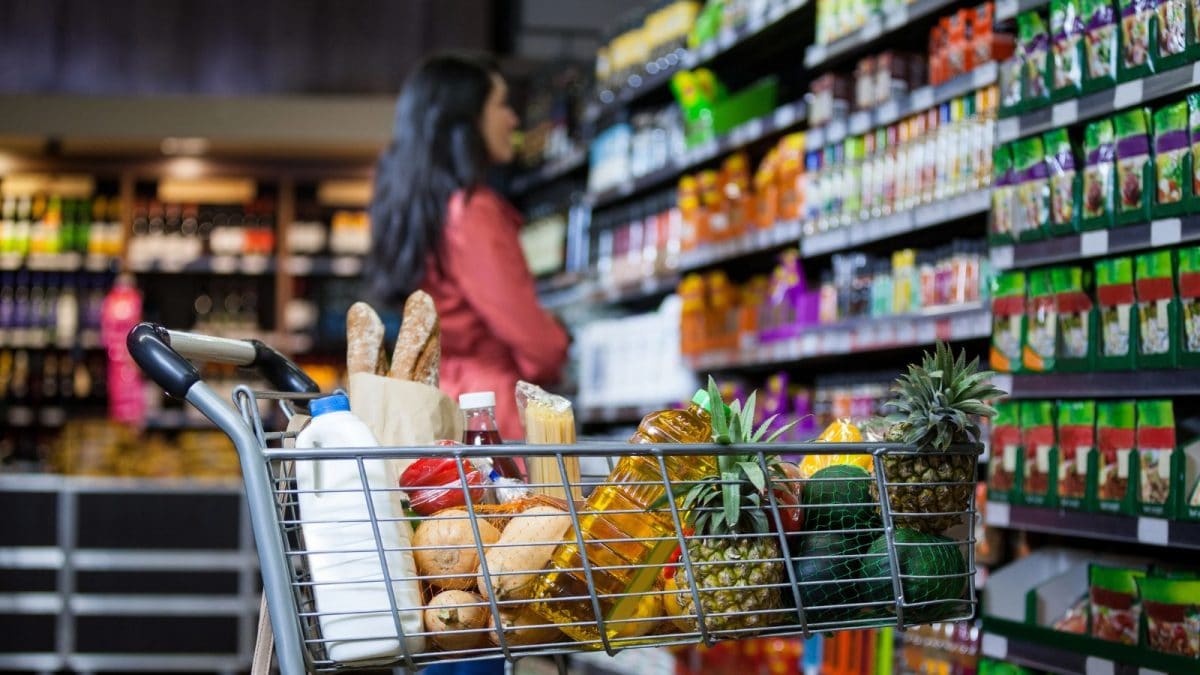Last Updated:
GST rate cut on groceries, medicines, restaurant meals, hotel stays and flights could ease monthly budget pressures for Indian households

From your kitchen staples to bathroom essentials, the GST Council has slashed rates on a wide range of daily use products.
India’s indirect tax system is undergoing its biggest reset since GST was introduced in 2017. The four-tier structure of 5, 12, 18 and 28% is being replaced with just two core slabs — 5% and 18% — while a new 40% rate has been created for luxury and ‘sin goods’. The changes, scheduled to take effect from September 22, come ahead of the festive season and are aimed at streamlining compliance and boosting household consumption.
From groceries and medicines to restaurant meals and air tickets, the revised tax rates are expected to influence day-to-day expenses across categories. But how much of a difference will it really make to your monthly budget? Here’s a detailed FAQ that breaks it down.
Recommended Stories
Will My Grocery Bill Reduce After The Changes?
Yes, many food items are now cheaper. Milk, paneer, roti, parathas and pizza bread are fully exempt from GST. Butter, ghee, jams, sauces, soups, pasta, namkeens and confectionery will be taxed at 5% instead of the earlier 12–18%. Dry fruits like almonds, cashews and pistachios are also at 5%.
For a family spending Rs 8,000–10,000 on groceries, this could mean savings of a few hundred rupees every month, depending on how much packaged and processed food is bought.
What About Medicines And Healthcare Costs?
This is one of the largest areas of relief. 33 life-saving drugs, including cancer and rare-disease treatments, are now GST-free. Most other medicines, diagnostic kits, thermometers and medical devices fall into the 5% bracket, down from 12–18%. Importantly, life and health insurance premiums have been exempted from GST entirely.
For households with recurring spends on medicines and insurance, this will directly lower monthly costs. A middle-class family paying Rs 3,000 a month on premiums and medicines could save Rs 250–300 monthly.
Do Everyday Household Items Get Cheaper?
Yes. Items used daily such as soaps, shampoos, hair oil, toothpaste, toothbrushes, shaving kits, talcum powder, candles and safety matches are all down to 5%. Stationery items, toys and bamboo-based furniture are also cheaper. Since these purchases are made regularly, the impact will be visible in monthly supermarket bills, trimming routine household expenditure.
How Will Eating Out Change?
Meals at restaurants will now attract 5% GST, down from the previous 12–18% depending on category.
For a family that eats out twice a month with an average spend of Rs 3,000–4,000, this translates into savings of Rs 200–400 a month. With the festive and wedding season approaching, the lower GST is expected to boost demand in the restaurant sector while giving families some breathing space on leisure spending.
What About Hotels And Flights?
- Hotels: Rooms under Rs 1,000/night remain tax-free. Tariffs up to Rs 7,500/night are now taxed at 12%, down from 18%. Premium hotels above Rs 7,500 continue at 18%.
- Flights: Economy class is down to 5% from 12%, while business class falls to 12% from 18%.
For households that travel during festivals or weddings, this means lower holiday budgets, with per-ticket and per-night savings that add up for families travelling together.
ALSO READ| What Gets Cheaper, What Gets Costlier After GST Council’s Big Tax Reset: Full List
What If I Plan To Buy A Vehicle Or Renovate My Home?
Big-ticket categories also see changes. Cement, previously at 28%, is now taxed at 18%, reducing the cost of construction and renovation. Small cars, motorcycles below 350cc, bicycles and electric vehicles also fall into the 18% slab. While these are not monthly expenses, they reduce the upfront burden of larger purchases and indirectly ease financial planning.
What Gets More Expensive?
Not everything is cheaper. Cigarettes, pan masala, gutkha and other tobacco products now attract a steep 40% GST, up from 28%. Fizzy and caffeinated drinks, SUVs, high-end motorcycles, yachts and private aircraft also fall into this category.
For households that consume tobacco or aerated drinks regularly, monthly outgo will rise sharply, offsetting savings on essentials. Coal, premium apparel and certain paper products have also moved into higher brackets.
✅ What Gets Cheaper (GST Reduced)
| Item | From | To |
|---|---|---|
| ACs | 28% | 18% |
| Agarbatti | 12% | 18% |
| All diagnostic kits | 12% | 5% |
| All goods incl. refined sugar cubes | 12% | 5% |
| Ambulances | 28% | 18% |
| Apparel up to ₹2,500 | 12% | 5% |
| Bandages, dressing | 12% | 5% |
| Beverages containing milk | 12% | 5% |
| Bicycles & delivery tricycles (non-motorized) | 12% | 5% |
| Bidis | 28% | 18% |
| Bodies for motor vehicles | 28% | 18% |
| Bumpers & tractor parts | 18% | 5% |
| Butter, ghee, oil | 12% | 5% |
| Candles, tapers | 12% | 5% |
| Carpets | 12% | 5% |
| Cheese | 12% | 5% |
| Chocolates & food preps | 18% | 5% |
| Cocoa powder | 18% | 5% |
| Coffee | 12% | 5% |
| Coffee extracts | 18% | 5% |
| Combs, hair pins | 12% | 5% |
| Condensed milk | 12% | 5% |
| Confectionery | 18% | 5% |
| Contact & spectacle lenses | 12% | 5% |
| Dates | 12% | 5% |
| Dental floss, toothpaste | 18% | 5% |
| Diabetic foods | 12% | 5% |
| Diesel cars ≤1500cc & ≤4000mm | 28% | 18% |
| Dishwashing machines | 28% | 18% |
| Drinking water | 12% | 5% |
| Exercise/graph/lab notebooks | 12% | 0% |
| Fish & caviar, preserved | 12% | 5% |
| Footwear ≤₹2,500 | 12% | 5% |
| Frames & mountings for spectacles | 12% | 5% |
| Fruit juice | 12% | 5% |
| Glucometer & test strips | 12% | 5% |
| Hair oil, shampoo | 18% | 5% |
| Handbags | 12% | 5% |
| Handcrafted candles | 12% | 5% |
| Handicraft | 12% | 5% |
| Handmade/embroidered shawls | 12% | 5% |
| Hybrids ≤1200cc & ≤4000mm | 28% | 18% |
| Ice cream | 18% | 5% |
| Jams & fruit jellies | 12% | 5% |
| Khakhra, chapathi, roti | 5% | 0% |
| Maps | 12% | 0% |
| Mathematical/geometry/colour boxes | 12% | 5% |
| Motorcycles ≤350cc | 28% | 18% |
| Mustard, mayonnaise | 12% | 5% |
| Namkeens | 12% | 5% |
| Paneer/chenna | 5% | 0% |
| Paratha, parotta, Indian breads | 18% | 0% |
| Parts & accessories | 28% | 18% |
| Pasta | 12% | 5% |
| Pastry, cakes, biscuits, bread | 18% | 5% |
| Pencils, crayons | 12% | 0% |
| Petrol cars ≤1200cc & ≤4000mm | 28% | 18% |
| Pizza bread | 5% | 0% |
| Plant-based milk | 18% | 5% |
| PV cells | 12% | 5% |
| Retail medicines | 12% | 5% |
| Shaving cream & lotions | 18% | 5% |
| Shrimps & prawns, preserved | 12% | 5% |
| Silicon wafers | 12% | 5% |
| Solar water heater | 12% | 5% |
| Soups & broth | 18% | 5% |
| Soya milk drinks | 12% | 5% |
| Spectacles, corrective | 12% | 5% |
| Talcum/face powder | 18% | 5% |
| Tender coconut water | 12% | 5% |
| Thermometers | 18% | 5% |
| Three-wheeled vehicles | 28% | 18% |
| Toilet soap | 18% | 5% |
| Tooth powder | 12% | 5% |
| TVs | 28% | 18% |
| Tyres for tractors | 18% | 5% |
| Umbrellas | 12% | 5% |
| Waters incl. mineral/aerated | 18% | 5% |
| Wind mills | 12% | 5% |
| Wood/stone idols | 12% | 5% |
❌ What Gets Costlier (GST Increased)
| Item | From | To |
|---|---|---|
| Aerated beverages with sugar | 28% | 40% |
| Apparel over ₹2,500 | 12% | 18% |
| Caffeinated beverages | 28% | 40% |
| Carbonated beverages with fruit juice | 28% | 40% |
| Cigars & cigarettes | 28% | 40% |
| Hybrids >1200cc or >4000mm | 28% | 40% |
| Motor cars (other categories) | 28% | 40% |
| Motorcycles >350cc | 28% | 40% |
| Non-alcoholic beverages | 18% | 40% |
| Pan masala | 28% | 40% |
| Revolvers & pistols | 28% | 40% |
| Smoking pipes | 28% | 40% |
| Tobacco | 28% | 40% |
| Yachts & pleasure vessels | 28% | 40% |
Overall, How Does This Affect My Monthly Budget?
- Groceries and essentials: Lower costs on milk, paneer, butter, snacks and dry fruits.
- Healthcare and insurance: Reduced monthly outgo due to lower GST on medicines and zero tax on premiums.
- Personal care and household: Cheaper soaps, shampoos and daily FMCG items.
- Eating out and travel: Smaller restaurant, hotel and flight bills.
- Sin goods and luxury: Substantially higher costs for cigarettes, pan masala and fizzy drinks.
For a middle-class household, the reset means visible monthly relief on essentials and leisure, estimated at Rs 500–1,000 a month in savings depending on lifestyle. The only increase will be for those who consume heavily taxed sin or luxury goods.
About the Author
The News Desk is a team of passionate editors and writers who break and analyse the most important events unfolding in India and abroad. From live updates to exclusive reports to in-depth explainers, the Desk d…Read More
The News Desk is a team of passionate editors and writers who break and analyse the most important events unfolding in India and abroad. From live updates to exclusive reports to in-depth explainers, the Desk d… Read More
Loading comments…
Read More




